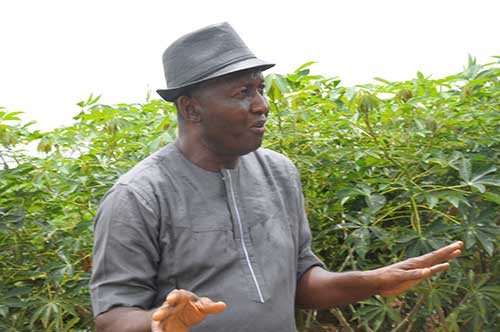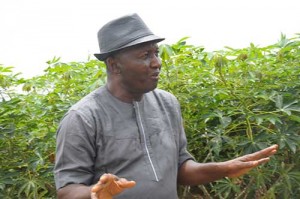Oil producing countries are looking for other ways to improve their fortune, rather than depend on the liquid gold, whose dwindling price produces ripple effects on the global economy.
HarvestPlus Country Director, Paul Ilona, argues in this interview with Senior Correspondent, GODDIE OFOSE, in Ibadan that vitamin A cassava can be an alternative foreign exchange earner for Nigeria.
On cassava
Cassava is a robust crop able to withstand disease, drought and pests. It can grow on poor marginal soil and is thus cultivated and eaten where both poverty and malnutrition is widespread.
Vitamin A is an essential nutrient lacking in the diets of poor, malnourished populations. Vitamin A deficiency retards growth, increases risk of disease, and can cause reproductive disorders.
Bio fortifying cassava with pro vitamin A (converted in the body to vitamin A) could significantly improve nutrition and overall health, especially among poorer communities.
Marketing vitamin A cassava
Our strategy relies a lot on providing a catalyst that will drive investors because there is no way as a project that we will be able to move away completely from social services into a highly commercialised area.
We want to create a new template that will enable the organised private sector to see an opportunity for it to invest and make money. This is one of the reasons we have this point of sale established here.
We are at Ojutayi village, Oyo State where we see what it means for someone to invest in a mini model processing centre that can give you up to one tonne of garri (cassava flour) per day without you investing very heavily on that.
At the point when you have one tonne of garri per day in a rural area you may have problem in distribution if you don’t have the right linkages.
Food products today in Africa already have their established marketing networks. The garri you see in the big market may be coming from Umunede in Delta State or from as far away as Otukpo in Benue. How is it organised?
There are bulking agents who already know themselves and are very experienced in networking. Some of these agents go to weekly markets and buy in bulk from local famers and then transport to gain what they call transport efficiency.
When the product gets to their base, they have their retailing outlets already well established and they begin to sell to their retail points. This is how it has been happening.
Some of the garri in Bodija market in Ibadan comes from the Oyo axis and some from as far away as Benue. At Bodija market there is a depot where bulking and sending of garri is done. Retailers go there to buy.
We don’t want to change this system, we want to bring in one or two innovations. We have looked at the whole system and we are trying to copy it, but we are bringing in one or two things so that it will become a lot more efficient.
We have seen the point of sale opposite IITA (International Institute of Tropical Agriculture), Ojo in Oyo State, which will act as a primary bulking point for all the processors around this axis.
What we expect to see is that farmers in Iseyin, Ijaiye, and other villages process vitamin A cassava into garri and fufu (another variant of cassava flour). They eat the one they can eat and sell the one they can sell locally.
There is quantum they cannot sell; and we say don’t worry we will sell it for you. We send it to the point of sale and also go on air to sensitise retailers to come for them. From this point we now expect retailers to come around to pick what they need to retail to consumers all around.
We hope to see this model become very profitable because it is the profitability that people see that will make them want to invest in it.
Lagos is a very big market for us and there is no doubt that we will surely hit the Lagos market. But who will do that? Is it HarvestPlus as a project? That is not sustainable. We can bring onboard those bulking agents in Lagos who understand the market.
Cost of 300 retail outlets nationwide
We shall bear that initial cost because we want to support this project until it stabilises. The aspect of market creation is what we take very seriously, too.
This is why we cannot but work with the media; collectively we will be able to create the awareness we need to drive investment in that sector.
We have done our little calculation and know that if we truly want Nigerians to have improved access to more nutritious food we need to have nothing less than 300 outlets in Nigeria within the next two years.
Our conclusion on 300 outlets is that we looked at the major market and populations, then realised that if we have fewer than 10 in Ibadan for instance it is not cost efficient and it is not going to ensure that products get to the people. If we don’t have up to 20 in Lagos it is not going to work.
In the next one or two years we are going to ensure that this centre works optimally and we do the proper book keeping to show investors that there is a lot of money coming in.
After two months we will go to the next stage of sensitisation by bringing investors together, and they will do all the calculation and see all the benefits and opportunities in investing in the food sector.
We need to do a lot of awareness creation. We will be going into business education and we shall be relying a lot on advocacy from the federal and state governments.
The number of retailing points in Oyo State alone is more than 300. So, when we say 300 in Nigeria it is still on the low side. That is the minimum scale we can go to make the minimum impact.
E-market platform
The emarket is functioning. Recently, we got a request from the Anambra State government for almost 900 bundles of cassava stems. Farmers have geared up and are beginning to cut the stems. This is what makes the emarket very potent for sales.
We got a request from Kwara for 500 kilogrammes of garri. We are not working in Kwara but somebody who knows how to go online put in a request.
The reason we don’t have so much request coming online yet is because we have not popularised it. So, we are hoping to bring in the media once again so that they can communicate better.
Difference between vitamin A cassava and conventional one
Vitamin A cassava is a lot more nutritious than the conventional one. The garri contains 16 microgrammes per gramme of vitamin A. If we know the importance of having vitamin A in our body then we know that no one should beg us to go for more nutritious food.
The era when people ate because they wanted to satisfy their hunger is gone. This is the era where you will eat because you know your body cells require some key elements.
Nigeria is a big country and we should learn to live big, and one of the ways to live big is to eat good food.
Agriculture in the face of falling oil price
Check the advanced countries in the world, they all started from food security. Look at the history of the United States and Europe, their development started from agriculture. When the slave era started it was to drive agriculture, that was why a lot of blacks were picked to work on their plantations.
We cannot jettison agriculture if we truly want to grow. Today, despite the importance of oil, agriculture is still known to contribute about 44 per cent of our Gross Domestic Product (GDP). Why not invest your time and resources in a field that is more sustainable? The oil sector is good, but don’t lay all your eggs in just one basket.
We should develop what we need, using what we have. Nigeria’s population is approaching 170 million. Statistics show that over 50 per cent of this population lives in rural areas, and over 70 per cent of those in rural areas are famers.
If we truly want to help develop Nigeria then agriculture is the area to go. No field in life will pay as much as agriculture does. Our strength is in agriculture.
How many oil wells do we have and how many hectares of agriculture do we have? Let us put the best into it, and I assure you that we will make a lot of profit.
Getting Nigerians to key into vitamin A cassava
My father once told me that when the first car came to Lagos everybody ran away; and also when the first plane came, people also ran away. But today we know if you don’t travel by air you will have to travel in a car. If you refuse to use either of them you will remain highly sedentary.
That is one story about technology. No technology gains acceptance immediately. It does not happen, you are bound to have challenges. You are going to have your early adopters, and you are going to have your laggards, those who will say ‘no, this is not the way to go.’
The question is how are you going to manage these two extremes. Those who are too enthusiastic sometimes do not pay attention to detail and they end up making mistakes and end up disappointing others. That is not what we want.
We want to sustain the interest of our early adopters and build the interest of laggards. One of the strengths we have as Nigerians is that when we see a potent technology, we know; and when we believe it, we buy into it.
No technology comes with ease, but for a development agency, your resilience, tenacity, and ability to realise from the outset that not everybody will want to listen to you will keep you active. You are going to make very great effort.
Any dark side of vitamin A cassava?
It is like asking what the downside of food is. I have problems in identifying a major one.
When we come to production we may say the dry matter content in vitamin A cassava is not as high as that of conventional cassava. There is a big advantage because the lower dry matter in it means that when you consume the garri you will not be loading your body with excess starch.
How do we make cassava a more nutritious food, not only from the angle of having vitamin A in it, but for the fact that when it is eaten, it does not provoke problems in the body?
The reason people are going for wheat today is because of the communication that wheat contains less starch compared with fufu.
But we all know better today that vitamin A cassava, especially if you pull down the stem and allow the starch breakdown into glucose, you will end up having garri with very low starch content.














